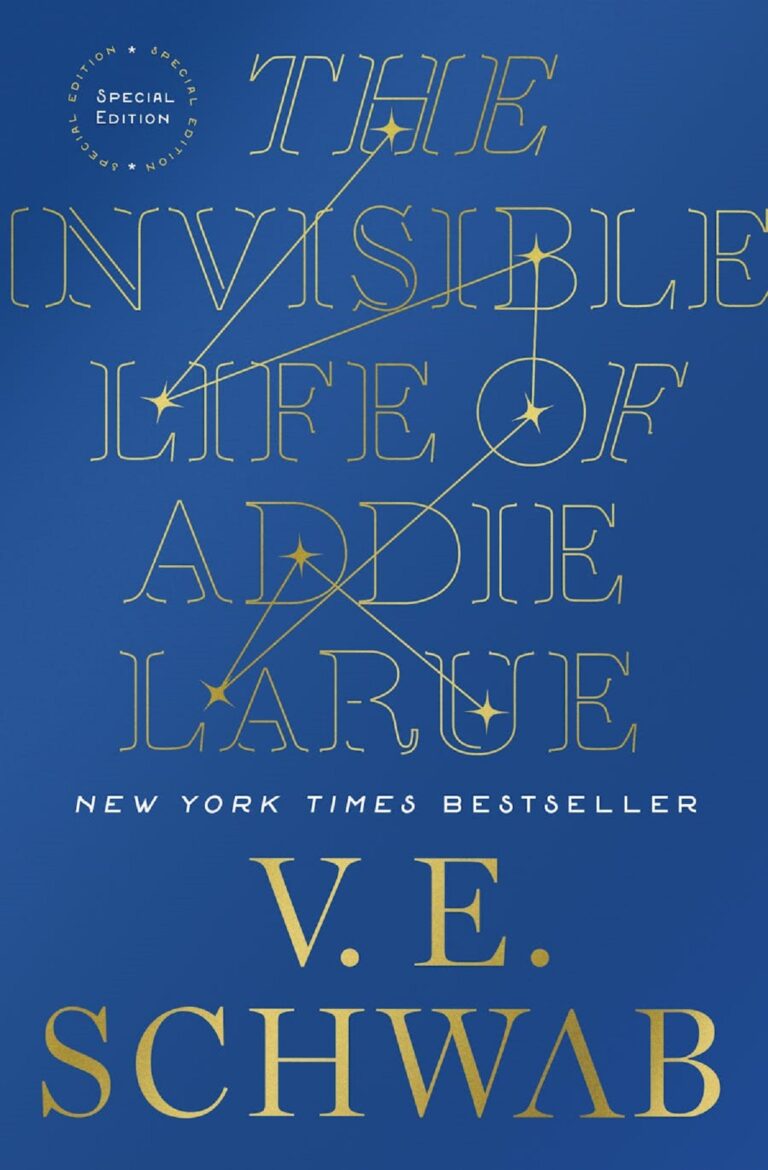The following excerpt is from The Invisible Life of Addie LaRue.
New York City
March 10, 2014
I
The girl wakes up in someone else’s bed.
She lies there, perfectly still, tries to hold time like a breath in her chest; as if she can keep the clock from ticking forward, keep the boy beside her from waking, keep the memory of their night alive through sheer force of will.
She knows, of course, that she can’t. Knows that he’ll forget. They always do.
It isn’t his fault—it is never their faults.
The boy is still asleep, and she watches the slow rise and fall of his shoulders, the place where his dark hair curls against the nape of his neck, the scar along his ribs. Details long memorized.
His name is Toby.
Last night, she told him hers was Jess. She lied, but only because she can’t say her real name—one of the vicious little details tucked like nettles in the grass. Hidden barbs designed to sting. What is a person, if not the marks they leave behind? She has learned to step between the thorny weeds, but there are some cuts that cannot be avoided—a memory, a photograph, a name.
In the last month, she has been Claire, Zoe, Michelle—but two nights ago, when she was Elle, and they were closing down a late-night café after one of his gigs, Toby said that he was in love with a girl named Jess—he simply hadn’t met her yet.
So now, she is Jess.
Toby begins to stir, and she feels the old familiar ache in her chest as he stretches, rolls toward her—but doesn’t wake, not yet. His face is now inches from her, his lips parted in sleep, black curls shadowing his eyes, dark lashes against fair cheeks.
Once, the darkness teased the girl as they strolled along the Seine, told her that she had a “type,” insinuating that most of the men she chose—and even a few of the women—looked an awful lot like him.
The same dark hair, the same sharp eyes, the same etched features.
But that wasn’t fair.
After all, the darkness only looked the way he did because of her. She’d given him that shape, chosen what to make of him, what to see.
Don’t you remember, she told him then, when you were nothing but shadow and smoke?
Darling, he’d said in his soft, rich way, I was the night itself.
Now it is morning, in another city, another century, the bright sunlight cutting through the curtains, and Toby shifts again, rising up through the surface of sleep. And the girl who is—was—Jess holds her breath again as she tries to imagine a version of this day where he wakes, and sees her, and remembers.
Where he smiles, and strokes her cheek, and says, “Good morning.”
But it won’t happen like that, and she doesn’t want to see the familiar vacant expression, doesn’t want to watch as the boy tries to fill in the gaps where memories of her should be, witness as he pulls together his composure into practiced nonchalance. The girl has seen that performance often enough, knows the motions by heart, so instead she slides from the bed and pads barefoot out into the living room.
She catches her reflection in the hall mirror and notices what everyone notices: the seven freckles, scattered like a band of stars across her nose and cheeks.
Her own private constellation.
She leans forward and fogs the glass with her breath. Draws her fingertip through the cloud as she tries to write her name. A—d—
But she only gets as far as that before the letters dissolve. It’s not the medium—no matter how she tries to say her name, no matter how she tries to tell her story. And she has tried, in pencil, in ink, in paint, in blood.
Adeline.
Addie.
LaRue.
It is no use.
The letters crumble, or fade. The sounds die in her throat.
Her fingers fall away from the glass and she turns, surveying the living room.
Toby is a musician, and the signs of his art are everywhere.
In the instruments that lean against the walls. In the scribbled lines and notes scattered on tables—bars of half-remembered melodies mixed in with grocery lists and weekly to-do’s. But here and there, another hand—the flowers he’s started keeping on the kitchen sill, though he can’t remember when the habit started. The book on Rilke he doesn’t remember buying. The things that last, even when memories don’t.
Toby is a slow riser, so Addie makes herself tea—he doesn’t drink it, but it’s already there, in his cupboard, a tin of loose Ceylon, and a box of silk pouches. A relic of a late-night trip to the grocery store, a boy and a girl wandering the aisles, hand in hand, because they couldn’t sleep. Because she hadn’t been willing to let the night end. Wasn’t ready to let go.
She lifts the mug, inhales the scent as memories waft up to meet it.

